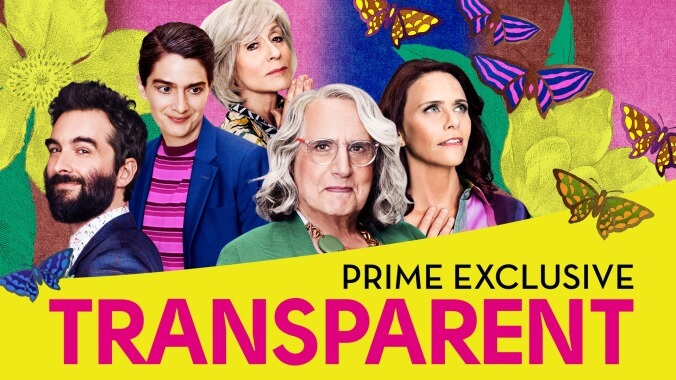“So Nitzan, is the gun loaded?” Josh asks of the Baby Desert Eagle that Chekhov’s ghost hung on Moshe’s personal security detail. It’s not just the gun that’s gone off by the end of the episode: Transparent is firing in multiple directions throughout “Desert Eagle,” even occasionally hitting a target or two. When it does, it’s usually because of Maura, whose feelings about being abandoned by Moshe give way to thoughts of when she abandoned herself. The meeting between Jeffrey Tambor and Zoe Van Brunt has a real poetry to it, its dialogue matched to shots of the arid terrain, its hallucinatory effect underlining a reckoning that began with “Born Again.” The whole pitstop has this jittery feeling to it, with the sensation that director Andrea Arnold is building to an explosive climax.
When she does, there’s enough jittering to feel like Transparent is about shake any of its remaining bolts loose. And as the Pfeffermans huddle together, screaming at one another about one of their few remaining secrets, it’s again the filmmaking that’s worth singling out. The jarring cuts, the shaky cam, that ellipsis of Josh, having just pointed his gun at the mother he knows to well yet barely knows, slumping his shoulders and drifting into the sand. It’s handled as delicately as the subject matter demands and as artfully as is appropriate. And Judith Light is on a goddamn tear, lacing a different, major revelation—one that sounds like severe postpartum depression—into a rant about being ignored and underestimated by her family members. (In one of the script’s defter touches, that old Pfefferman selfishness arises when Maura admits that she thought she was the “secret” alluded to in To Shell And Back.)
But that rant, as magnetic as it is, is also indicative of “Desert Eagle” swinging wildly every which way—the episode that contains moving images of a cracked desert floor and that bogus dream sequence in which Sarah chokes down an Ensure and Ali’s first-hand experience with inequity in the West Bank. “Desert Eagle” is anxiety all around, characters recognizing, like Sarah does when she jolts awake in that hammock, that despite deeper connections to the people around them and the places they’re going, they’re all strangers in a strange land. The ways in which they’re alike, they’re unlikely to cop to. Shelly and Josh were both taken advantage of by older authority figures. Sarah and Maura have loaded weapons in their hands, and they take aim at easy and vulnerable targets: Sarah at Len, and Maura at Shelly.
Reeling from what starts as Moshe’s disinterest and degenerates into Moshe’s transphobic ignorance (flailing to connect, he wonders aloud about the lack of male influence in Maura’s childhood), Maura needles her ex-wife with the news that she’s dating a man. It’s a scene we’ve seen many times before, one that Tambor and Light have grown adept at playing over the years. (Think of the birthday dinner in “To Sardines And Back,” and the looks the actors trade when Maura makes her birthday wish to be called “Mom” rather than “Moppa.”) As Transparent keeps pursuing larger ideas and wandering into sand traps, it’s nice to be reminded that this sort of petty sniping in intimate quarters is still very much in its wheelhouse. The show is nothing without its characters and its road-tested relationships.
That’s what makes Shelly’s divulgence so heartbreaking—and its histrionic conclusion a different type of heartbreaking. Why, why, why, does “Desert Eagle” punctuate this cathartic outburst with a final line straight out of Tom Servo’s one-man show Robot On The Run? How does the righteous fury of “It was like fingernails on a chalkboard when they called me ‘Mommy’” turn into Light screaming the name of Shelly’s lecherous music teacher and saying the words “I was molested” as if they’re supposed to be followed by a melodramatic organ sting? The filmmaking’s so sharp, but the tone crumbles under the weight of the secret.
But at least the secret’s out now. No more bottling it up, no more relegating it to flashbacks. Those last images of Josh suggest that a reconciliation, and a deeper understanding of each other, is coming between mother and son. (It’s also the last use of a “Desert Eagle” motif in which the camera isn’t pointing at the person we expect it to be pointed at.) I don’t expect what comes next to be tidy, but I do hope it didn’t pull this out of Shelly for just a gut-punch of an episode-closer.














![HBO teases new Euphoria, Larry David, and much more in 2026 sizzle reel [Updated]](https://img.pastemagazine.com/wp-content/avuploads/2025/12/12100344/MixCollage-12-Dec-2025-09-56-AM-9137.jpg)


























